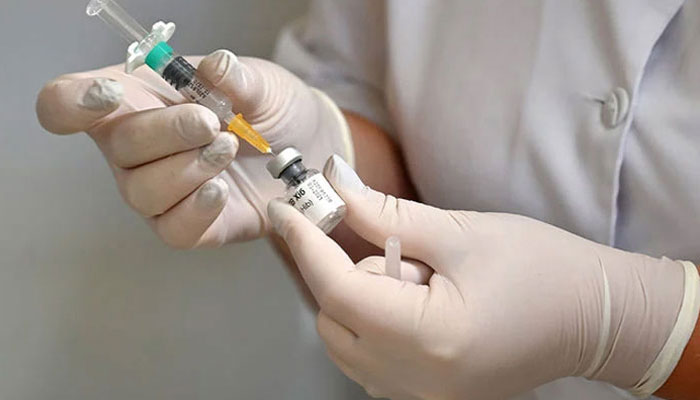Vaccination refusal by parents has led to 26 diphtheria-related deaths
Dr. Kamran Qureshi, stresses media’s responsibility in raising awareness
ISLAMABAD: Refusal by parents in getting their children has resulted in deaths of 26 children due to diphtheria, a vaccine-preventable disease, in Khyber Pakhtunkhwa so far this year while over 380 diphtheria cases have been reported across 27 districts, Expanded Program on Immunization (EPI) officials have revealed.
“Alarmingly, 91% of those infected were unvaccinated, which highlights the critical need for routine immunization against vaccine-preventable diseases (VPDs)”, said Dr. Muhammad Asghar, Director of the Expanded Program on Immunization (EPI) Khyber Pakhtunkhwa.
Speaking at a two-day orientation workshop for health reporters, organized by UNICEF in collaboration with the provincial EPI in Islamabad, Dr. Asghar provided alarming insights into the outbreak.
“As of week 46, diphtheria cases have surged across 228 union councils, with 27 laboratory-confirmed outbreaks identified in districts like Peshawar, Mardan, DI Khan, Bannu, and Kohat. Of the 383 cases, 75% are aged five and above, ranging from as young as seven months to as old as 68 years,” he disclosed.
Diphtheria-related deaths were reported in Peshawar (12), Nowshera (3), Charsadda (3), Mohmand (2), and other districts. None of the deceased had received the DPT (diphtheria, pertussis, and tetanus) vaccine, a crucial component of Pakistan’s EPI schedule.
Dr. Asghar urged the media to play a proactive role in dispelling misconceptions about routine immunization and encouraging parents to vaccinate their children. “Without routine immunization, even eradication efforts for polio will remain incomplete. Vaccines are life-saving tools, and their importance cannot be overstated,” he emphasized.
UNICEF’s Immunization Officer, Dr. Kamran Qureshi, stressed the media’s responsibility in raising awareness. “Vaccines are a child’s birthright. The 12 vaccines in Pakistan’s EPI program not only prevent life-threatening diseases but also protect families from economic hardships associated with medical treatments,” he said.
He also addressed parental concerns regarding post-vaccination fever, emphasizing that “fever following vaccination is normal and manageable.” He also highlighted the importance of vaccinating zero-dose children, who are particularly vulnerable to mortality and morbidity.
“It’s crucial for parents to trust healthcare professionals and adhere to the immunization schedule,” he added. Senior health journalist associated with The News International and media trainer Muhammad Waqar Bhatti underscored the role of responsible reporting in building public trust in vaccination campaigns. “Health journalists must ensure accuracy in their reporting and collaborate with health authorities to improve vaccination coverage. However, they must also hold officials accountable for any lapses,” he advised.
Officials attending the workshop also highlighted gaps in the immunization system, including a lack of booster doses for diphtheria in the routine EPI schedule. Officials recommended launching an emergency vaccination campaign targeting affected age groups, enhancing management of close contacts, and implementing strict infection control measures in hospitals.
President of the Peshawar Press Club, Arshad Aziz Malik, reiterated the media’s role in advocating for vaccination and healthcare improvements.
“The media must serve as a bridge between health authorities and the public to combat vaccine hesitancy and misinformation,” he said.
The workshop concluded with a call for unified efforts from health authorities, journalists, and communities to curb the spread of diphtheria and improve routine immunization coverage across Pakistan.
-
 Prince Harry And Meghan Unlikely To Meet Royals In Jordan
Prince Harry And Meghan Unlikely To Meet Royals In Jordan -
 Hero Fiennes Tiffin Shares Life-changing Advice He Received From Henry Cavill
Hero Fiennes Tiffin Shares Life-changing Advice He Received From Henry Cavill -
 Savannah Guthrie's Fans Receive Disappointing News
Savannah Guthrie's Fans Receive Disappointing News -
 Prince William Steps Out For First Solo Outing After Andrew's Arrest
Prince William Steps Out For First Solo Outing After Andrew's Arrest -
 Jake Paul Chooses Silence As Van Damme Once Again Challenges Him To Fight
Jake Paul Chooses Silence As Van Damme Once Again Challenges Him To Fight -
 Google Disrupts Chinese-linked Hacking Groups Behind Global Cyber Attacks
Google Disrupts Chinese-linked Hacking Groups Behind Global Cyber Attacks -
 Four People Killed In Stabbing Rampage At Washington Home
Four People Killed In Stabbing Rampage At Washington Home -
 Meghan Pushes Prince Harry Into Territory That’s Dangerous To His Brand: ‘She Isn’t Hearing A Word Of It’
Meghan Pushes Prince Harry Into Territory That’s Dangerous To His Brand: ‘She Isn’t Hearing A Word Of It’ -
 Christina Applegate Reflects On Lasting Impact Of Being Molested In Childhood
Christina Applegate Reflects On Lasting Impact Of Being Molested In Childhood -
 Martin Short Makes Big Decision Following Tragic Death Of Daughter
Martin Short Makes Big Decision Following Tragic Death Of Daughter -
 Antarctica’s Mysterious ‘gravity Hole’: What’s Behind The Evolution Of Earth’s Deep Interior?
Antarctica’s Mysterious ‘gravity Hole’: What’s Behind The Evolution Of Earth’s Deep Interior? -
 Hilary Duff Addresses Ashley Tisdale's 'toxic Mom Group' Claims And Matthew Koma's Firey Response
Hilary Duff Addresses Ashley Tisdale's 'toxic Mom Group' Claims And Matthew Koma's Firey Response -
 Jack Hughes's Proximity To Trump Angers Tate McRae Fans
Jack Hughes's Proximity To Trump Angers Tate McRae Fans -
 Neve Campbell Opens Up About Her 'difficult Decision' To Not Sign 'Scream 6'
Neve Campbell Opens Up About Her 'difficult Decision' To Not Sign 'Scream 6' -
 Nobel-winning Scientist Resigns From Columbia University After Epstein Links Revealed
Nobel-winning Scientist Resigns From Columbia University After Epstein Links Revealed -
 Prince William Remarks At BAFTAs 'indicative' Of King Charles Physical, Mental Health Too
Prince William Remarks At BAFTAs 'indicative' Of King Charles Physical, Mental Health Too




